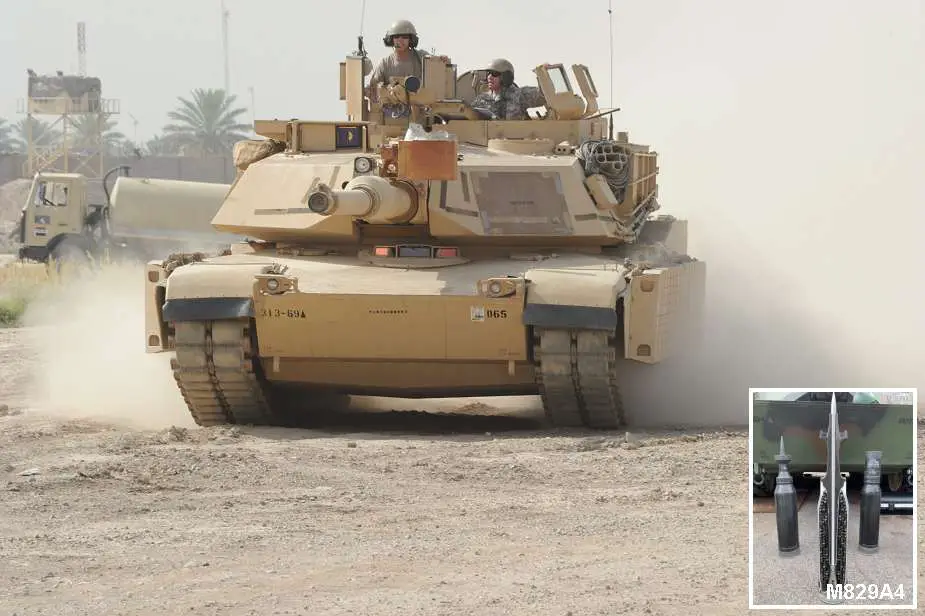Breaking news
US To Send Depleted Uranium Ammo to Ukraine to Fight Modern Russian Tanks.
In a groundbreaking move, the United States has decided to send armor-piercing munitions containing depleted uranium to Ukraine. This marks the first time such controversial ammunition will be supplied to the country. The International Press Agency Reuters reported this revelation on September 1, 2023. These munitions, compatible with the M1A1 Abrams Main Battle Tanks (MBTs) set to be delivered to Ukraine, offer enhanced destructive capabilities against Russian tanks.
Follow Army Recognition on Google News at this link

The US M1A1 Abrams that will be donated to Ukraine is able to fire depleted uranium ammunition. (Picture source U.S. DoD)
The M829 is an American armor-piercing fin-stabilized discarding sabot (APFSDS) tank round, specifically designed for the 120 mm M256 main gun on the Abrams M1A1 and M1A2 main battle tanks. Both the M829A3 and M829A4 variants use a depleted uranium penetrator.
Depleted uranium ammunition is renowned for its superior armor-piercing capabilities, making it especially effective against heavily armored vehicles. Experts believe that this type of ammunition will significantly enhance Ukraine's ability to counter and destroy Russian tanks, should the need arise.
This decision is part of a broader military aid package for Ukraine, details of which are expected to be unveiled in the coming week. The munitions are designed to be fired from the U.S. M1 Abrams Main Battle Tanks, which are also part of the aid package. The delivery of these tanks to Ukraine is anticipated in the next few weeks.
It's worth noting that U.S. President Biden had previously announced the supply of M1 Abrams tanks to Ukraine back in January 2023. As part of this commitment, the United States is set to deliver 31 M1A1 Abrams tanks, specifically opting for the older M1-A1 models over the more modern versions.
The introduction of depleted uranium ammunition into the equation underscores the U.S.'s commitment to bolstering Ukraine's defense capabilities amidst ongoing tensions in the region. However, the decision is also likely to draw scrutiny given the controversial nature of depleted uranium and its potential environmental and health impacts.
Depleted uranium (DU) ammunition offers distinct advantages over standard ammunition, especially in the context of armored warfare. One of the primary benefits is its higher density. Depleted uranium is significantly denser than materials like lead or steel, which are commonly used in other types of ammunition. This high density allows DU rounds to maintain their shape and trajectory better when fired, leading to increased accuracy.
Another unique characteristic of DU rounds is their "self-sharpening" property. Unlike traditional tungsten rounds that tend to deform upon impact, DU rounds fragment in a way that the core of the round remains sharp, allowing for deeper penetration. This property, combined with the pyrophoric nature of DU, means that upon impact, these rounds can produce incendiary effects. The friction from penetration can cause the DU to ignite, leading to secondary damage inside the target, such as fires or explosions, especially if the target is a vehicle with fuel or ammunition onboard.
Furthermore, the superior armor penetration of DU ammunition means it can effectively penetrate modern armored vehicles more than most other types of ammunition. Another advantage is its cost-effectiveness. Depleted uranium is a byproduct of the uranium enrichment process for nuclear reactors, making DU rounds relatively cost-effective to produce compared to other advanced armor-piercing rounds.
However, the use of DU ammunition is not without controversy. Residual DU can contaminate the environment, posing risks to both nature and humans. There have been concerns about the health effects of DU exposure on soldiers and civilians, including potential risks of cancer and other diseases. The exact health implications remain a topic of debate and research. Moreover, the use of DU in conflict zones necessitates post-conflict cleanup efforts to mitigate potential risks to the local population and environment. Despite these concerns, many militaries value DU ammunition for its unparalleled armor-piercing capabilities, especially when facing heavily armored adversaries.
Defense News September 2023


























